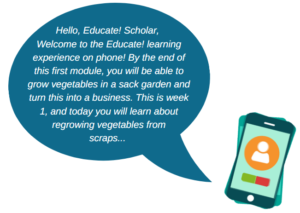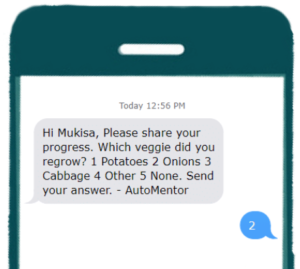 Posner Center tenant, Educate!, works with schools and governments in Uganda, Rwanda, and Kenya to help support and implement an innovative skills-based educational model that is contextually adaptive to the places in which they work. The Educate! Model is designed to deliver sustainable, lasting change by working directly within existing education systems, integrating on a systemic level, advising on curriculum reform, and preparing youth for the modern economy by equipping them with the hard and soft skills necessary to succeed.
Posner Center tenant, Educate!, works with schools and governments in Uganda, Rwanda, and Kenya to help support and implement an innovative skills-based educational model that is contextually adaptive to the places in which they work. The Educate! Model is designed to deliver sustainable, lasting change by working directly within existing education systems, integrating on a systemic level, advising on curriculum reform, and preparing youth for the modern economy by equipping them with the hard and soft skills necessary to succeed.
When one thinks of beginning the recovery from the COVID-19 crisis, there are a great many things that spring to mind that need to be addressed, but few can deny that education is an area of paramount importance. As of July 23rd, 107 countries have fully closed schools, while others have widespread local closures, affecting over one million students, and making up 61% of total enrolled learners, according to the UNESCO Institute for Statistics. These figures aren’t just representative of a loss in the growth and development of future generations, but they also reflect tangible dangers in the present, such as the loss of valuable resources like nutrition and child care, exposure to high-risk factors like peer-pressure and substance abuse, increased dropout rates, and susceptibility to violence and exploitation. Educate! knows that the longer students are out of school, the less likely they are to return. After the 2014 Ebola outbreak, in some regions, the enrollment rates for girls never returned to their pre-outbreak levels, and studies have frequently shown that when schools close, the rates of teen pregnancy, child labor, and recruitment into militias rise.
To combat this, Educate! decided to pivot their skills-based education model towards innovative distance learning solutions, according to local needs and context, and leveraging their government partnerships to help support youth while schools are closed. While transitioning to remote education has no doubt been a challenge globally, it is especially challenging for rural regions where internet and electricity are scarce. Thus, the labor for Educate! became one of establishing sustainable and efficient distance learning strategies that were just as effective as their in-person work, while keeping it low-tech and easily accessible enough so that your average student could use it easily, even in the absence of infrastructure. It was also important for their model to keep students actively involved by emphasizing two-way communications and interactive programming in order to maximize student engagement, and in turn, achievement.

This model takes a variety of different forms depending on the country in which Educate! works and what the situation requires. In Uganda, Educate! provide their flagship student experience model—aptly named Educate! Experience—via radio, telecommunications, and social media, which essentially aims to bring the same skills and present the same opportunities that their in-person model would. They are able to do this by leveraging their existing network of over 300 trained youth Mentors, and using strategic, targeted outreach.
In Rwanda, Educate! partners with the Rwanda Education Board to convert two key subjects to radio: Entrepreneurship and Physics. They have helped develop 50 radio scripts over a diverse array of topics, and helped develop entrepreneurship questions for at-home student quizzes used by the Ministry of Education’s Unstructured Supplementary Service Data system.

Meanwhile, in Kenya, Educate! is creating an e-learning platform for motorcycle couriers (“Boda Boda”), which will focus on coaching drivers to safely conduct deliveries whilst improving prospects and earnings. The strategy aims to build on what’s called the “leapfrog effect,” or a country’s ability to adopt the newest version of a technology without the need for years and years of the development that other countries have gone through. The most classic example of this in effect is telecommunications. When telephones were first introduced, there was a need for a mass network of cables. Now, with mobile phone technology, there is no need to build those mass networks. Hence, a country can “leapfrog” over the process that took decades to come about. Educate! expects this to be true with e-commerce and delivery in Kenya, and hopes to possibly expand the platform into other arenas.
While these programs are all in response to COVID-19 and obviously not as ideal as being able to work in-person with students, Educate! is hoping that these solutions will go on to improve their working model in the future. Once schools begin to gradually reopen and Educate! are able to resume their proven in-school model, the idea is to take what worked with these distance learning strategies, and integrate them going forward, thereby increasing their ability to scale and improving the cost-effectiveness of their work. All of these distance strategies were considered prior to COVID-19, and so this reprioritization enforced by the pandemic actually enables Educate! to effectively meet the crisis head on, while simultaneously avoiding the pitfalls of “one-off” solutions, and ideally strengthening their impact in the future.
As one can imagine, this is a difficult process and is certainly not an exact science. Educate! CEO and co-founder, Boris Bulayev, and Director of Revenue Strategy, Loren Crary, recently penned an article on the challenges and lessons from this reorganization, highlighting the difficulties of prioritizing forward-thinking, innovative, and proactive ideas, while also ensuring the continued near-term survival of a model that was built for mass delivery at scale. The important thing to take away from all of this is simple: this isn’t easy. There is no panacea for what the coronavirus has wrought upon us. Yet Educate! are doing the best they can to stay nimble, progressive, and flexible, while ensuring that their foundations, missions, and visions remain steadfast. And there is plenty to be learned from that.
Read more about Educate!’s COVID-19 response here .
